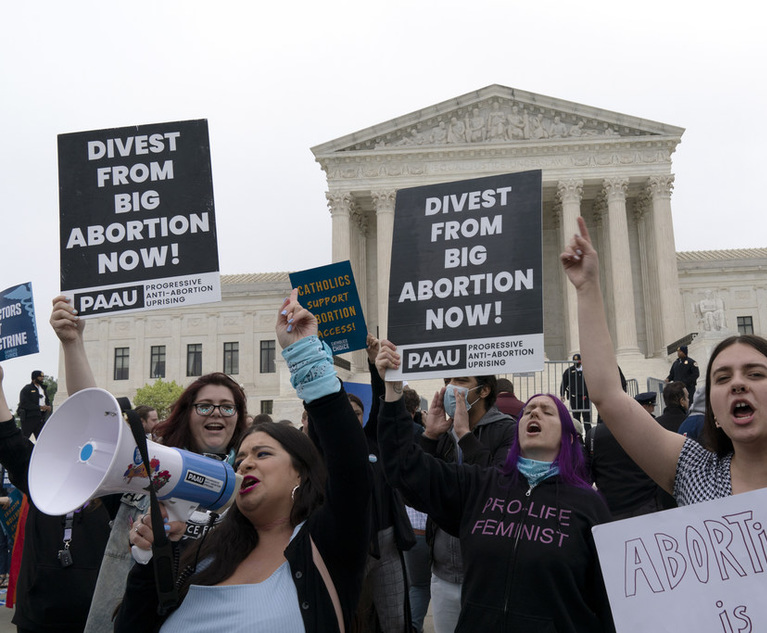 Demonstrators protest outside of the U.S. Supreme Court on May 3, 2022, in Washington. Photo: Jose Luis Magana/AP
Demonstrators protest outside of the U.S. Supreme Court on May 3, 2022, in Washington. Photo: Jose Luis Magana/AP You Can't Have It Both Ways
"Joel Cohen and Gerald Lefcourt are old friends with whom I generally agree legally and politically. But their argument in defense of protesting in front of the homes of Supreme Court Justices is dangerous to the First Amendment and must be rejected."
June 02, 2022 at 10:00 AM
2 minute read
Joel Cohen and Gerald Lefcourt are old friends with whom I generally agree legally and politically. But their argument in defense of protesting in front of the homes of Supreme Court Justices is dangerous to the First Amendment and must be rejected. They argue that "morality … has nothing whatsoever to do with this," and that condemning immoral protests while defending the constitutional rights of immoral protestors to do immoral things "undercuts the right to protest." They have it exactly backwards. Their view would limit constitutionally protected speech which they find morally acceptable. But the First Amendment fully protects immoral speech as much as it does moral speech—perhaps even more so because immoral speech is more likely to be censored.
I defended the rights to Nazis to express their immoral ideas, while insisting on my right to condemn them and their ideas as immoral. If I accepted the Cohen and Lefcourt argument, I could not condemn Nazi speech as immoral without undercutting the right to protest. Condemning the content and/or acts themselves, while defending the Constitutional right to engage in condemnable speech, lies at the core of the First Amendment. I am surprised that Cohen and Lefcourt don't seem to understand this.
This content has been archived. It is available through our partners, LexisNexis® and Bloomberg Law.
To view this content, please continue to their sites.
Not a Lexis Subscriber?
Subscribe Now
Not a Bloomberg Law Subscriber?
Subscribe Now
NOT FOR REPRINT
© 2025 ALM Global, LLC, All Rights Reserved. Request academic re-use from www.copyright.com. All other uses, submit a request to [email protected]. For more information visit Asset & Logo Licensing.
You Might Like
View All
Attorney Responds to Outten & Golden Managing Partner's Letter on Dropped Client
3 minute read
Letter to the Editor: Law Journal Used Misleading Photo for Article on Election Observers
1 minute read
NYC's Administrative Court's to Publish Some Rulings in the New York Law Journal Is Welcomed. But It Should Go Further
4 minute readTrending Stories
- 1Uber Files RICO Suit Against Plaintiff-Side Firms Alleging Fraudulent Injury Claims
- 2The Law Firm Disrupted: Scrutinizing the Elephant More Than the Mouse
- 3Inherent Diminished Value Damages Unavailable to 3rd-Party Claimants, Court Says
- 4Pa. Defense Firm Sued by Client Over Ex-Eagles Player's $43.5M Med Mal Win
- 5Losses Mount at Morris Manning, but Departing Ex-Chair Stays Bullish About His Old Firm's Future
Who Got The Work
J. Brugh Lower of Gibbons has entered an appearance for industrial equipment supplier Devco Corporation in a pending trademark infringement lawsuit. The suit, accusing the defendant of selling knock-off Graco products, was filed Dec. 18 in New Jersey District Court by Rivkin Radler on behalf of Graco Inc. and Graco Minnesota. The case, assigned to U.S. District Judge Zahid N. Quraishi, is 3:24-cv-11294, Graco Inc. et al v. Devco Corporation.
Who Got The Work
Rebecca Maller-Stein and Kent A. Yalowitz of Arnold & Porter Kaye Scholer have entered their appearances for Hanaco Venture Capital and its executives, Lior Prosor and David Frankel, in a pending securities lawsuit. The action, filed on Dec. 24 in New York Southern District Court by Zell, Aron & Co. on behalf of Goldeneye Advisors, accuses the defendants of negligently and fraudulently managing the plaintiff's $1 million investment. The case, assigned to U.S. District Judge Vernon S. Broderick, is 1:24-cv-09918, Goldeneye Advisors, LLC v. Hanaco Venture Capital, Ltd. et al.
Who Got The Work
Attorneys from A&O Shearman has stepped in as defense counsel for Toronto-Dominion Bank and other defendants in a pending securities class action. The suit, filed Dec. 11 in New York Southern District Court by Bleichmar Fonti & Auld, accuses the defendants of concealing the bank's 'pervasive' deficiencies in regards to its compliance with the Bank Secrecy Act and the quality of its anti-money laundering controls. The case, assigned to U.S. District Judge Arun Subramanian, is 1:24-cv-09445, Gonzalez v. The Toronto-Dominion Bank et al.
Who Got The Work
Crown Castle International, a Pennsylvania company providing shared communications infrastructure, has turned to Luke D. Wolf of Gordon Rees Scully Mansukhani to fend off a pending breach-of-contract lawsuit. The court action, filed Nov. 25 in Michigan Eastern District Court by Hooper Hathaway PC on behalf of The Town Residences LLC, accuses Crown Castle of failing to transfer approximately $30,000 in utility payments from T-Mobile in breach of a roof-top lease and assignment agreement. The case, assigned to U.S. District Judge Susan K. Declercq, is 2:24-cv-13131, The Town Residences LLC v. T-Mobile US, Inc. et al.
Who Got The Work
Wilfred P. Coronato and Daniel M. Schwartz of McCarter & English have stepped in as defense counsel to Electrolux Home Products Inc. in a pending product liability lawsuit. The court action, filed Nov. 26 in New York Eastern District Court by Poulos Lopiccolo PC and Nagel Rice LLP on behalf of David Stern, alleges that the defendant's refrigerators’ drawers and shelving repeatedly break and fall apart within months after purchase. The case, assigned to U.S. District Judge Joan M. Azrack, is 2:24-cv-08204, Stern v. Electrolux Home Products, Inc.
Featured Firms
Law Offices of Gary Martin Hays & Associates, P.C.
(470) 294-1674
Law Offices of Mark E. Salomone
(857) 444-6468
Smith & Hassler
(713) 739-1250







